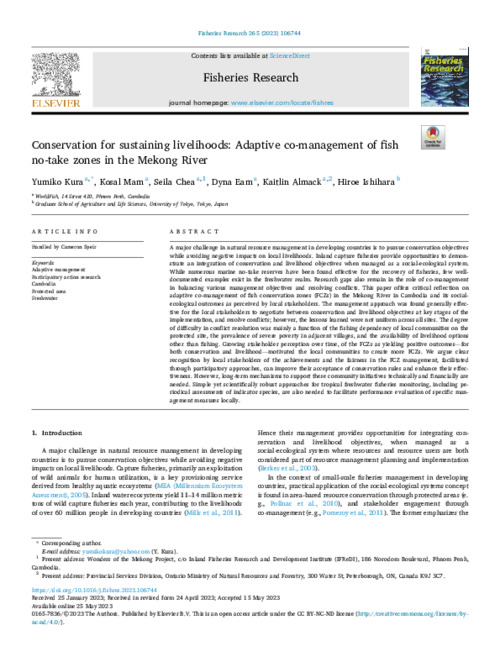Please use this identifier to cite or link to this item:
https://hdl.handle.net/20.500.12348/5789
Conservation for sustaining livelihoods: Adaptive co-management of fish no-take zones in the Mekong River
| dc.creator | Kura, Y. | en_US |
| dc.creator | Mam, K. | en_US |
| dc.creator | Chea, S. | en_US |
| dc.creator | Eam, D. | en_US |
| dc.creator | Almack, K. | en_US |
| dc.creator | Ishihara, H. | en_US |
| dc.date.accessioned | 2024-01-21T05:23:44Z | |
| dc.date.available | 2024-01-21T05:23:44Z | |
| dc.date.issued | 2023 | en_US |
| dc.identifier.citation | Yumiko Kura, Kosal Mam, Seila Chea, Dyna Eam, Kaitlin Almack, Hiroe Ishihara. (1/9/2023). Conservation for sustaining livelihoods: Adaptive co-management of fish no-take zones in the Mekong River. Fisheries Research, 265. | en_US |
| dc.identifier.issn | 0165-7836 | en_US |
| dc.identifier.issn | 872-6763 | en_US |
| dc.identifier.uri | https://hdl.handle.net/20.500.12348/5789 | |
| dc.description.abstract | A major challenge in natural resource management in developing countries is to pursue conservation objectives while avoiding negative impacts on local livelihoods. Inland capture fisheries provide opportunities to demonstrate an integration of conservation and livelihood objectives when managed as a social-ecological system. While numerous marine no-take reserves have been found effective for the recovery of fisheries, few well-documented examples exist in the freshwater realm. Research gaps also remain in the role of co-management in balancing various management objectives and resolving conflicts. This paper offers critical reflection on adaptive co-management of fish conservation zones (FCZs) in the Mekong River in Cambodia and its social-ecological outcomes as perceived by local stakeholders. The management approach was found generally effective for the local stakeholders to negotiate between conservation and livelihood objectives at key stages of the implementation, and resolve conflicts; however, the lessons learned were not uniform across all sites. The degree of difficulty in conflict resolution was mainly a function of the fishing dependency of local communities on the protected site, the prevalence of severe poverty in adjacent villages, and the availability of livelihood options other than fishing. Growing stakeholder perception over time, of the FCZs as yielding positive outcomes—for both conservation and livelihood—motivated the local communities to create more FCZs. We argue clear recognition by local stakeholders of the achievements and the fairness in the FCZ management, facilitated through participatory approaches, can improve their acceptance of conservation rules and enhance their effectiveness. However, long-term mechanisms to support these community initiatives technically and financially are needed. Simple yet scientifically robust approaches for tropical freshwater fisheries monitoring, including periodical assessments of indicator species, are also needed to facilitate performance evaluation of specific management measures locally. | en_US |
| dc.format | en_US | |
| dc.language | en | en_US |
| dc.publisher | Elsevier (12 months) | en_US |
| dc.rights | CC-BY-NC-ND-4.0 | en_US |
| dc.source | Fisheries Research;265,(2023) | en_US |
| dc.subject | adaptive management | en_US |
| dc.subject | protected area | en_US |
| dc.title | Conservation for sustaining livelihoods: Adaptive co-management of fish no-take zones in the Mekong River | en_US |
| dc.type | Journal Article | en_US |
| cg.contributor.funder | Foundation Ensemble | en_US |
| cg.contributor.funder | Critical Ecosystem Partnership Fund | en_US |
| cg.contributor.funder | Ministry of Foreign Affairs, Japan | en_US |
| cg.coverage.country | Cambodia | en_US |
| cg.coverage.region | South-Eastern Asia | en_US |
| cg.subject.agrovoc | freshwater | en_US |
| cg.subject.agrovoc | cambodia | en_US |
| cg.subject.agrovoc | participatory action research | en_US |
| cg.subject.agrovoc | fish | en_US |
| cg.contributor.affiliation | WorldFish | en_US |
| cg.contributor.affiliation | The University of Tokyo | en_US |
| cg.identifier.status | Open access | en_US |
| cg.identifier.ISIindexed | ISI indexed | en_US |
| cg.contribution.worldfishauthor | Kura, Y. | en_US |
| cg.contribution.worldfishauthor | Mam, K. | en_US |
| cg.contribution.worldfishauthor | Chea, S. | en_US |
| cg.contribution.worldfishauthor | Eam, D. | en_US |
| cg.contribution.worldfishauthor | Almack, K. | en_US |
| cg.description.theme | Sustainable aquaculture | en_US |
| dc.identifier.doi | https://dx.doi.org/10.1016/j.fishres.2023.106744 | en_US |
| cg.creator.id | Yumiko Kura: 0000-0002-1774-1943 | en_US |
| cg.creator.id | Kosal Mam: 0000-0002-5022-9853 | en_US |
| cg.subject.actionArea | Resilient Agrifood Systems | en_US |
| cg.contributor.initiative | Aquatic Foods | en_US |
Files in this item
This item appears in the following Collection(s)
-
Sustainable aquaculture [2735]
